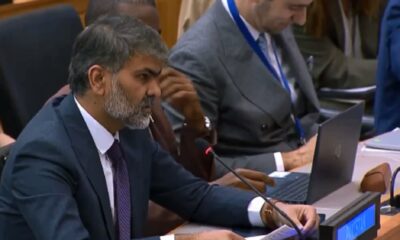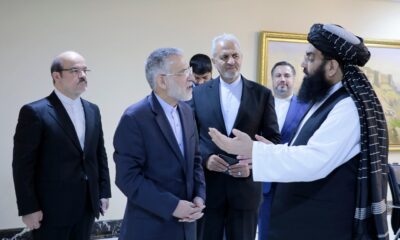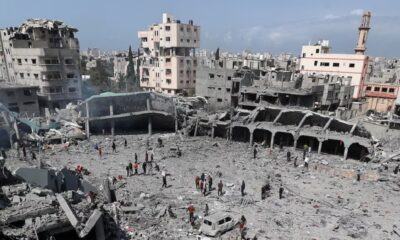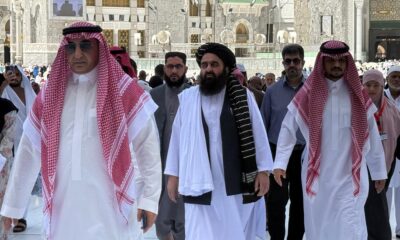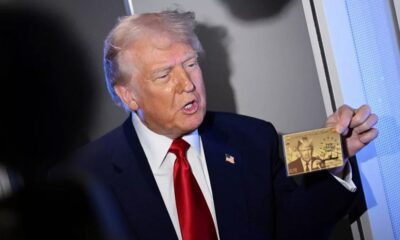Regional
TTP warn of more attacks against police after Karachi compound raid

Tehreek-e-Taliban Pakistan (TTP) warned Saturday of more attacks against law enforcement officers, a day after four people were killed when a suicide squad stormed a police compound in Karachi.
The police are often used on the frontline of Pakistan’s battle with the TTP and are frequently a target of militants who accuse them of extra-judicial killings, AFP reported.
Last month, more than 80 officers were killed when a suicide bomber detonated an explosive vest at a mosque inside a police compound in the northwestern city of Peshawar, sparking criticism from some junior ranks, who said they were having to do the army’s work.
“The policemen should stay away from our war with the slave army, otherwise the attacks on the safe havens of the top police officers will continue,” Tehreek-e-Taliban Pakistan (TTP) said Saturday in an English-language statement.
“We want to warn the security agencies once again to stop martyring innocent prisoners in fake encounters otherwise the intensity of future attacks will be more severe.”
On Friday evening, a TTP suicide squad stormed the sprawling Karachi Police Office compound in the southern port city, prompting an hours-long gun battle that ended when two of the attackers were shot dead and a third blew himself up.
Two police officers, an army ranger and a civilian sanitary worker died in the attack, officials said.
The tightly guarded compound in the heart of the city is home to dozens of administrative and residential buildings as well as hundreds of officers and their families.
Fierce gun battle
Interior minister Rana Sanaullah told Samaa TV the assailants entered the compound after firing a rocket at the gate before seizing the main Karachi Police Office building and taking refuge on the roof.
The sound of gunfire and grenade blasts echoed through the neighborhood for hours as security forces slowly made their way up five floors to end the siege.
The TTP emerged in Pakistan in 2007 and carried out a horrific wave of violence that was largely crushed by a military operation launched in late 2014.
But attacks — mostly targeting security forces — have been on the rise again and a shaky months-long ceasefire between the TTP and Islamabad ended in November last year.
Prime Minister Shehbaz Sharif has vowed to stamp out the violence, AFP reported.
“Pakistan will not only uproot terrorism but will kill the terrorists by bringing them to justice,” he tweeted late Friday.
Regional
Israeli troops expand ‘security zone’ in northern Gaza

Israeli troops were expanding their control of ground in northern Gaza, the military said on Friday, days after the government announced plans to seize large areas with an operation in the south.
Soldiers carrying out the operation in Shejaia, a suburb east of Gaza City in the north, were letting civilians out via organised routes, as troops moved in to expand the area defined by Israel as a security zone in Gaza, a statement said, Reuters reported.
Images circulating on social media showed an Israeli tank on Al Muntar hill in Shejaia, in a position that gave it clear sight over Gaza City and beyond to the shoreline. Shelling on the eastern side of Gaza was non-stop, a local health official said in a text message.
Where Israeli forces moved in, hundreds of residents had already left a day earlier, carrying belongings or loading them on to vans or donkey carts, after the military issued the latest in a series of evacuation warnings that now cover around a third of the Gaza Strip, according to the United Nations.
Israel resumed its operation in Gaza with a heavy series of air strikes on March 18 and sent troops back in after a two-month pause during which 38 hostages were returned in exchange for hundreds of Palestinian prisoners and detainees.
Efforts at restarting negotiations, brokered by Egypt and Qatar, have stalled. “There are currently no contacts,” a Palestinian official close to the mediation effort told Reuters.
Over the past two weeks, more than 280,000 people have been displaced in Gaza, according to U.N. humanitarian agency OCHA, adding to misery for families already repeatedly displaced over the past 18 months.
“I swear to God that I am staying in the street, there is no shelter here,” said 40-year-old Hemam Al-Rifi, who said members of his family were killed when the Gaza City school complex they were sheltering in was hit by a deadly strike on Thursday.
“My house was destroyed at first, and I stayed in a tent in a school, not a classroom, and now I don’t know where to go.”
In Gaza City, local people said Israeli strikes had hit a water desalination plant that was vital in providing clean drinking water. Aid supplies have been cut off for weeks.
On the southern edge of Gaza, Israeli troops have been consolidating around the ruins of the city of Rafah and the U.N. says 65% of the enclave is now within “no go” areas, under active displacement orders, or both.
Ministers have said the operation will continue until 59 hostages still held in Gaza are returned. Hamas says it will free them only under a deal that brings a permanent end to the war. On Friday, a spokesperson for the group’s armed wing said half of the hostages were being held in areas where people had been told to evacuate.
“If the enemy is concerned about the lives of these hostages, it must immediately negotiate their evacuation or release,” Abo Ubaida said in a message on Telegram.
HUNDREDS KILLED
Israel has not fully explained its long-term aim for the areas it is now seizing as a security zone, extending an existing buffer area along the edge of the enclave hundreds of metres into the Gaza Strip.
Gaza residents say they believe the aim is to permanently depopulate swathes of land, including some of Gaza’s last farmland and water infrastructure.
Officials say the operations are in line with plans of U.S. President Donald Trump, who said in February he wanted to move the Gaza population into neighbouring countries and turn the enclave into a waterfront resort under U.S. control. Israel says it would encourage Palestinians who wish to leave voluntarily.On Friday, Gaza health authorities said at least 35 Palestinians were killed, most in southern areas of Gaza. Among the dead were 19 members of one family killed when a strike demolished the three-storey building where they were staying.
The military said its forces killed Mohammed Awad, a senior commander in the militant group Palestinian Mujahideen, who it said was involved in the abduction of hostages including the Bibas family during the attack on Israel on Oct 7, 2023, and was most likely involved in their killing.
Israel accuses Hamas of hiding fighters in civilian buildings and says it takes precaution to limit casualties, but hundreds of Palestinians have been killed since the operation resumed, according to local health authorities. More than 250 of the dead were armed militants, the military says.
As a ceasefire agreement that halted fighting in January has collapsed, the risk of a wider return to war has increased, with Israel striking targets in both Lebanon and Syria over recent days. On Friday, it said an air strike in the Lebanese city of Sidon killed a senior Hamas operative.
Israeli troops have also been engaged in an extended operation in the occupied West Bank, where two Palestinians were killed on Friday.
The war began when Hamas fighters stormed into Israeli communities on October 7, 2023, killing 1,200 people and capturing more than 250 hostages, by Israeli tallies. Since then, Israel has reduced much of Gaza to ruins and killed more than 50,000 Palestinians, according to the enclave’s health authorities.
Regional
Israel steps up Syria strikes, says Turkey aims for ‘protectorate’

Israel stepped up airstrikes on Syria, declaring the attacks a warning to the new Islamist rulers in Damascus as it accused their ally Turkey on Thursday of trying to turn the country into a Turkish protectorate.
Later on Thursday, Turkey said Israel must withdraw from Syria and stop harming stabilization efforts there, Reuters reported.
“Israel has become the greatest threat to regional security” and is a “strategic destabilizer, causing chaos and feeding terrorism,” the Foreign Ministry in Ankara said.
“Therefore, in order to establish security throughout the region, Israel must first abandon its expansionist policies, withdraw from the territories it occupies, and stop undermining efforts to establish stability in Syria,” it said.
The strikes, targeting a site near Damascus and air bases, put renewed focus on Israeli concerns about the Islamists who deposed Bashar al-Assad in December, with Israeli officials viewing them as a rising threat at their border.
Also suspicious of Ankara’s sway over Damascus, Israel has been working to advance its goals in Syria since Assad was toppled, seizing ground in the southwest, declaring a willingness to protect the Druze minority, lobbying Washington for a weak state, and blowing up much of the Syrian military’s heavy weapons and equipment in the days after Assad fell.
The Israeli army said its forces operating in the southwest overnight killed several militants who opened fire on them. They were on a targeted mission at the time beyond the separation zone where they are deployed inside Syria, it said.
Syria’s state news agency SANA said Israeli shelling had killed nine people in the area, during what it described as the deepest incursion yet by Israeli troops in the area.
Israeli Defence Minister Israel Katz said the airstrikes late on Wednesday evening were “a clear message and a warning for the future – we will not allow the security of the State of Israel to be harmed.”
Katz said in a statement that Israel’s armed forces would remain in buffer zones within Syria and act against threats to its security, warning Syria’s government it would pay a heavy price if it allowed forces hostile to Israel to enter.
Reflecting Israeli concerns about Turkish influence in the new Syria, Foreign Minister Gideon Saar accused Ankara of playing a “negative role” there, in Lebanon and other regions.
“They are doing their utmost to have Syria as a Turkish protectorate. It’s clear that is their intention,” he told a press conference in Paris.
The Syrian Foreign Ministry said the Israeli strikes were an unjustified escalation aimed at destabilising the country, calling on the international community to put pressure on Israel to “stop its aggression.”
Later on Thursday, Israeli strikes targeted the town of Kiswah, south of Damascus, according to Syria’s state news agency. There were no immediate reports of casualties and no immediate comment from the Israeli military.
Israel bombed Syria frequently when the country was governed by Assad, targeting the foothold established by his ally Iran during the civil war.
AIR BASE DESTROYED
The latest strikes were some of the most intense Israeli attacks in Syria since Assad was toppled.
The Syrian Foreign Ministry said Israel struck five separate areas within a 30-minute window, resulting in the near-complete destruction of the Hama air base and wounding dozens of civilians and soldiers.
The Israeli military said it had struck remaining military capabilities at air bases in Hama and Homs provinces, in addition to remaining military infrastructure in the Damascus area, where Syrian media and officials said the vicinity of a scientific research facility was hit.
In Hama, a Syrian military source told Reuters a dozen strikes demolished the runways, tower, arms depots and hangars at the military airport. “Israel has completely destroyed Hama air base to ensure it is not used,” the source said.
Israel also said on Wednesday it targeted the T4 air base in Homs province, which it has repeatedly hit over the past week.
In the incident in southwestern Syria, the Israeli military said its forces were operating in the Tasil area, “confiscating weapons and destroying terrorist infrastructure” when several militants fired on them.
Residents of the Tasil area reached by phone said a group of armed locals were killed after confronting an Israeli army contingent that had arrived in the area to destroy a former Syrian army encampment.
The Israeli military said there were no casualties among its forces who “responded with fire and eliminated several armed terrorists from the ground and air.”
“The presence of weapons in southern Syria constitutes a threat to the State of Israel,” it said. “The IDF will not allow a military threat to exist in Syria and will act against it.”
Regional
Military confrontation seems inevitable if no new Iran nuclear deal, France says
Western powers say the nuclear programme amounts to a disguised effort to develop an atomic bomb. Iran has long denied seeking nuclear weapons.

France’s foreign minister warned on Wednesday that if world powers were unable to quickly reach a new agreement with Iran over its contested nuclear programme then a military confrontation seemed “almost inevitable”.
Speaking after President Emmanuel Macron convened a rare and undisclosed meeting of key ministers and experts on Wednesday to discuss the Iran dossier, Jean-Noel Barrot appeared to ramp up the pressure on Tehran.
European powers are seeking to create a diplomatic path with a view to getting an agreement to curb Iran’s uranium enrichment activity by the summer and ahead of an October 2025 deadline, when U.N. sanctions related to a 2015 accord on Iran’s nuclear programme with world powers expire.
Western powers say the nuclear programme amounts to a disguised effort to develop an atomic bomb. Iran has long denied seeking nuclear weapons.
“The window of opportunity is narrow. We only have a few months until the expiration of this (2015) accord. In case of failure, a military confrontation would seem to be almost inevitable,” Barrot told a parliamentary hearing.
The earlier cabinet meeting, confirmed by three diplomatic sources, is rare and highlights mounting concern among Washington’s European allies that the United States and Israel could launch airstrikes on Iran’s nuclear facilities unless there is a quick negotiated deal on its nuclear programme.
The U.S. has reinforced military capabilities in the Middle East with more warplanes, the Pentagon said on Tuesday, amid a U.S. bombing campaign against the Houthis who control much of Yemen and are supported by Iran.
A senior European official said European strategists were asking themselves whether the campaign could be a precursor to a U.S. strike on Iran in the coming months.
Trump, who has urged Supreme Leader Ayatollah Ali Khamenei to engage immediately in negotiations, threatened Iran on Sunday with bombing and secondary tariffs if it did not come to an agreement over its nuclear programme.
The foreign minister of Iran’s direct adversary Israel will be in Paris on Thursday.
Diplomatic sources said ministers from France, Britain and Germany, all party to the 2015 deal, were hoping to discuss the Iran dossier with U.S. Secretary of State Marco Rubio when they convene in Brussels for a NATO ministerial meeting this week.
Trump withdrew the U.S. from the 2015 deal that placed strict limits on Tehran’s nuclear activities in exchange for sanctions relief.
Since then, Iran has far surpassed that deal’s limits on uranium enrichment, producing stocks at a high level of fissile purity, well above what Western powers say is justifiable for a civilian energy programme and close to that required for nuclear warheads.
The European powers have sought to raise pressure on Iran to coax it back into nuclear discussions. They have held several rounds of talks with Iran including at technical level last week, to try to lay the groundwork.
But the Trump administration has focused initially on a campaign of “maximum pressure”, and the Europeans have found coordination complicated, diplomats say.
The European powers, who can invoke a return of full UN sanctions before October, had hoped to convince Iran to begin negotiating new restrictions on its nuclear activities with a view to having a deal by August at the latest.
That would give enough time to set new limits for Iran’s programme and begin lifting sanctions before the 2015 accord expires in October 2025.
-

 Latest News4 days ago
Latest News4 days agoAfghanistan’s reconstruction is in the interest of EU: Uzbek president
-

 Latest News4 days ago
Latest News4 days agoUS won’t rest until all Americans detained in Afghanistan brought home: Rubio
-

 Latest News3 days ago
Latest News3 days agoMinistry of Economy calls on US to release Afghanistan’s frozen funds
-

 Latest News4 days ago
Latest News4 days agoBulgaria brings five people to trial over deaths of 18 Afghan migrants
-

 Latest News3 days ago
Latest News3 days agoPakistan ‘extends’ deadline for a week for Afghans to leave the country
-

 Regional5 days ago
Regional5 days agoChina launches military drills around Taiwan, calls its president a ‘parasite’
-

 Business4 days ago
Business4 days agoGold climbs to record high as tariff worries bolster safe-haven demand
-

 Sport4 days ago
Sport4 days agoIPL 2025: Batters in race for prestigious Orange Cap


